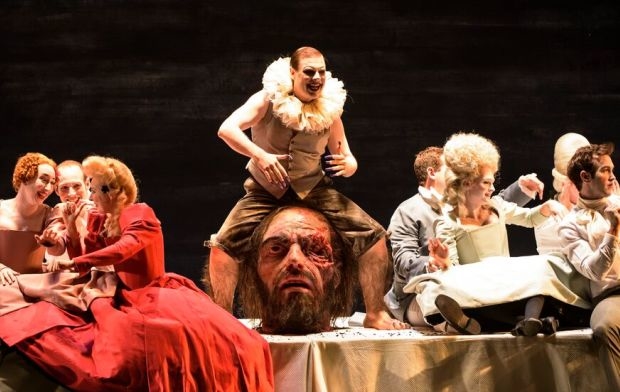Saul singin' – Anna Devin & Henry Waddington reveal all
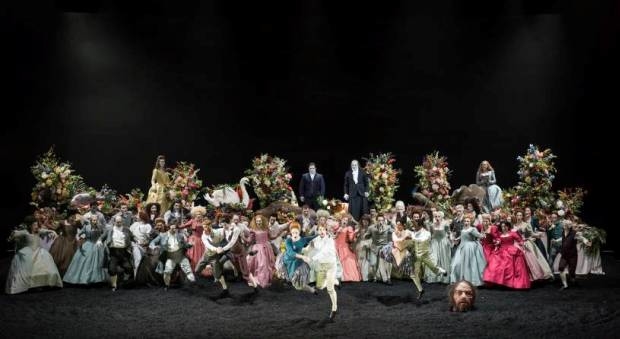
© Bill Cooper
The 2015 Glyndebourne Festival was a huge success. All six of its productions garnered critical acclaim, with four- and five-star reviews across the board from WhatsOnStage, and the company has been honoured at the UK Theatre Awards "for an outstandingly well planned and performed season".
The highlight for many was Australian director Barrie Kosky's bold and colourful stage realisation of Handel's oratorio Saul, a production that's about the be revived as part of the annual Glyndebourne Tour. WhatsOnStage spoke recently to bass-baritone Henry Waddington, who returns to the title role having played it at three performances in the summer, and to soprano Anna Devin who takes over as his daughter Michal.
Henry, you're the only singer who played the same part in the festival. Do you get impatient while everyone around you gets up to speed?
Henry Waddington (HW): No, I've loved it. In the summer I had some rehearsal but not a lot; I picked up three performances that Christopher Purves wasn't available to do, so it was all very quick and then suddenly it was my first night. This time it's been great: I'm discovering why I do certain things on stage which I never had time to sort out during the festival.
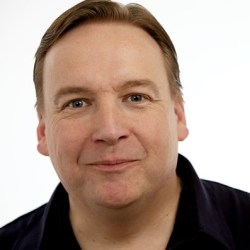
I only had one full rehearsal with the cast before I went on, and that was in the rehearsal room before my first night, so it was all a bit frantic. But I'd had a chat with Barrie Kosky and he'd just said 'make it your own'. He wasn't expecting me to do a carbon copy of what Chris does – we're different both physically and vocally.
It was very nerve-wracking – terrifying, standing in the wings – but once I got on and the adrenaline started pumping… it's such a fantastic show that you're taken along with it. It's the most exhausted I've ever been after a performance. Ivor Bolton was fantastic in the pit; very supportive and full of smiles.
Anna Devin (AD): I covered my role in the summer too as a last-minute thing, and when I saw some of the stage rehearsals I wasn't sure what to make of the production at all. Even at the dress rehearsal, seeing all the amazing costumes and the stark background, it presented such an extreme image. I'm very visual so I thought 'I'm not sure what this is'. But when you watch a show happen you see it from a completely different perspective.
Donna Stirrup, who's been reviving it. has been great at not just telling us 'stand here, do that'. I feel we're free to put our own mark on it. And the chemistry between the characters is so different. For me Saul is the focus of the whole piece and our characters bounce off him.
HW: Yes, the relationship between the father and daughters is a little different this time. A few changes have been made. Donna has been in constant touch with Barrie and hasn't done anything without his say so, but he was very much up for 'this is Henry, not Chris, so he'll have to find his own way of dealing with things'. And Anna's coming across as a much stronger character.
AD: Donna spoke to Barrie about the two sisters, and we're doing more this time round to bring them closer together. Michal, my character, wants to be with David. It's the first time she's fallen in love with anybody, and… you know that feeling when you're a teenager and you fancy somebody? You literally can't take your eyes off them and you just want to be in their presence. So she has to have a feistiness about her. And also Merab, as Sarah Tynan sings her, isn't just cruel and evil; she's got a softer side as well. So it won't be quite as black and white as it was in the summer.
HW: It's not changed so that it's blasting everything out of the water, but there are differences. And that was bound to happen with different singer-actors doing it.
I know you're bound by the same bar lines and note values, but is there a different energy when you have a different cast? Do you feel it on the stage?
HW: You do, because there's a different conductor too. Some tempi are different – Handel gives a lot of leeway with that anyway – so yes. In the same way as if you go and hear two performances of Saul on the concert platform they're never going to be the same either.
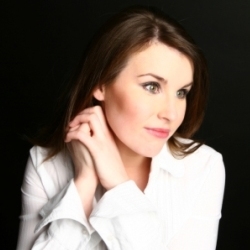
The big difference this time is that you all know it's a hit. Has that affected the way you've rehearsed it?
AD: No! You have to come in and treat it like any show. As a performer, if you start thinking 'what are the audience going to think?', then you're performing for something other than the integrity of the character and what she's experiencing at any given moment.
Coming into a production that's been such a huge success I'm just delighted to be in it. We're only doing seven shows on the tour and it's selling out everywhere. Handel opera doesn't always sell as well so it's great to be part of a show that might change people's opinions.
HW: It's nice because you start on day one knowing you're in a good show. But there's a slightly added pressure, too, because it was such a hit in the summer and we've got to come up with the goods as well. But I've already done it and for me it was a personal success, so now I can go on and try to make it better.
This is the second company, but it's in no way a B company. It's a strong cast.
HW: Absolutely. The musical and dramatic standards are just as high this time, and the production values too. Perhaps sometimes slightly more so, because since we're touring and taking it to different-sized stages, while we're at Glyndebourne we're making the playing area a little smaller. And actually that makes it more intimate.
Does Laurence Cummings bring a different texture to it as conductor?
AD: Yes, definitely. I've worked with Laurence a lot so I knew what to expect. The way it sounded with Ivor was more grand opera, but Laurence is big on how Handel oratorios are theatre of the mind, and he's trying to feature that. He'll say 'If Handel had written this as an opera he'd never have put in so much recitative. There's no need to explain because the audience can see what's happening.' So we've been exploring how to keep the integrity of the oratorio even though it's staged. It's great to chat to Laurence about that because he's just so passionate about these things. His knowledge is so deep. And he knows my voice inside out so working with him is a dream; but I can't get away with anything!
HW: It's interesting to stage this oratorio as an opera because Handel wrote in stage directions. Something like 'Saul throws the spear' is written in the score and reflected in the music at that moment. He always had the drama in mind when he wrote it and it is very dramatic. Some of it is quite new for Handel, even some of the instruments.
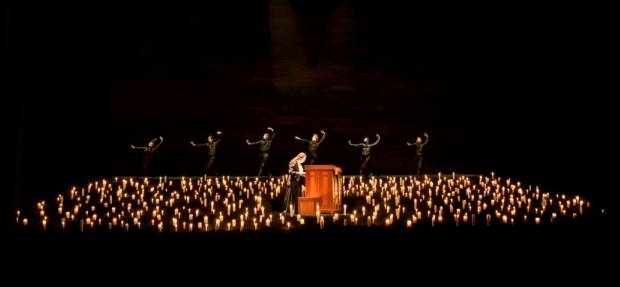
© Bill Cooper
What are the special challenges of this show? What's it like to move about on the set's notorious rubber crumb (artificial soil)?
AD: It's fine to move about on. But yesterday, when Michal throws herself on top of Saul, I breathed in and the crumb literally went right down my throat. So my worry is I need to be aware of that and make sure it's nowhere near my mouth.
HW: Bloody crumb! One of the first things Chris Purves said to me was 'when you're lying down, don't breathe in'. I love it though, because physically you can throw yourself around in it and it doesn't hurt so much. It's like having a massive crash mat around you.
Isn't it tiring on the feet?
AD: No, it's quite bouncy and nice to walk on.
HW: It can be a bit tiring, though, because it's uneven. Sometimes you tread in it and it's quite deep, a bit like that bottom step you forgot was there. But you get used to it very quickly. Actually the stage rake is more of a challenge than the crumb because it's so steep. The knees and the back have to deal with that. It's just a case of keeping fit.
What's next for you?
HW: The usual Messiahs at Christmas, then I'm off to Stuttgart to do my first Bartolo in The Barber of Seville. Following that I've got something very exciting lined up that I can't talk about yet.
AD: These last few months have been crazy. Luckily my agents have been on my side, and also I have a voice that tells me when enough is enough. Career-wise I'm doing more Mozart next year, and I'd love to start moving into more bel canto repertoire. But for now people still want me for the Baroque scene. I've learnt six Handel roles this year!
Wouldn't you like to play an out-and-out villain sometimes?
AD: I never have, and I've not really wanted to, but I'd love to play a more powerful character occasionally – like a princess. I did sing the Countess in Le Comte Ory for Blackheath Halls, and it was great to do a role that had that level of dignity. Most of my characters are under 20 so I'd love to play someone older; but I still enjoy doing what I do.
Saul plays at Glyndebourne on 24, 27 and 30 October, then tours to Canterbury, Milton Keynes, Norwich and Plymouth until 27 November.



